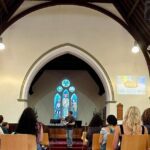In this article I want to share how we have strategically responded to a rapid change in ministry context we have experienced at the University of Tasmania’s (UTAS) Hobart campuses, where I lead the AFES staff team. I hope sharing our experience and response will be helpful to those at other universities that bear some similarities, and possibly still others in church and parachurch ministries who will face similar challenges in the future. Even where the challenges are not so extreme, I believe some of the phenomena we have been dealing with are present to a lesser degree in Australia generally. So some of our insights may be relevant even if our wholesale approach is not. We have drawn on general principles of missiology and ministry strategy, so I trust this eccentric case study will be stimulating to a wider audience.
COVID19 Disruption to University Ministry
The pandemic caused many disruptions to Christian ministry, including university student ministry. Across the country, the disruption triggered by the pandemic accelerated changes that were already taking place in tertiary institutions: financial pressures on university budgets and the impacts that this had on both faculty and the student body; increased flexibility in enrolment types (including part-time enrolments, rising proportions of mature-age enrolments and online study options); wide adoption of hybrid-learning course delivery. The experience of lockdowns and other COVID-safety policies also influenced the behaviour of young adults in the subsequent few years. All of these changes have flow-on effects to the behaviour of university students, the most obvious being decreased overall engagement in campus ministry activities.
Wider economic pressures including steep decreases in housing affordability further changed the behaviour of university students, responding to the decreased viability of student share-houses close to campuses and the lengthened commutes for local students whose parents could not afford to purchase a family home close to universities.
Moderate, Short-Term Disruption
On many university campuses, the impact of COVID-specific disruptions have proved to be moderate and short-term. The scale of permanent social and institutional change has also been moderate. Although university operations and student behaviour have not entirely snapped back to pre-COVID patterns, on many campuses there has been a fruitful return to a pattern of AFES ministry with roots in the 1980s, that could be characterised as a ‘church-like’ campus-based ministry: local full-time staff working with student leaders to run weekly, on-campus preaching and small groups, around which the rest of the ministry is built.
Catastrophic Disruption
But in some places, such as at UTAS, these short-term disruptions and social and structural changes have had a much larger and longer-term effect on the Christian Union (CU) that ministers to local students (and those international students who choose to join the CU).[1] In our context this has been catastrophic. Implementing in 2023 the ministry practices of 2013 has borne a mere fraction of the number of Christian students, student leaders and evangelistic contacts.
I was involved in the campus ministry at UTAS as a newly-converted undergraduate from 1998–2002, then as a pastor of a church in fellowship with AFES from 2002–2009 and now as a leader of the AFES staff team from 2010. In all that time I have never seen anything quite like what we have seen so far in the 2020s.
In addition to extreme expressions of the issues already listed, it is likely that there are additional contextual factors that have worked together to create something of a perfect storm. A major additional factor in Tasmania is UTAS’s attempt to relocate all of its Hobart campuses to the CBD, that has stalled and now has been partially aborted. There are also the specifics of Tasmania’s demographics: such as its population size (around half a million people), its relatively lower wealth and its fairly static and slowly ageing population. Geography also plays a part: as an island state, it is not connected by road to any larger population centres. You could explore the nature of the local church scene and possibly find still further contributing causes.
Whatever the explanations, the experience of campus ministry in Tasmania in the 2020s has been a matter of concern for us, not merely as AFES staff and student leaders, but also as Tasmanians concerned about the future health of our ‘gospel ecosystem’.
Mid-Term Impacts on the Gospel Ecosystem
What negative effects will we begin to notice across our churches in five or ten years if the campus ministry collapses? What will be the impact on leadership training and Christian worldview formation? On conversions, the fostering of a mission mindset, and evangelistic competence? On the maintenance of strong relational connections across the emerging adults of our state’s churches and denominations—what we might describe as ‘Christian social capital’?
As we have wrestled with these challenges, the staff and students leading the CU at UTAS in Hobart have realised we needed to entertain a significant paradigm shift in our ministry strategy. Two years into implementing these changes, we are beginning to see them gain traction. What marks this paradigm shift?
Abandon Assumptions About What AFES Ministry Must Look Like
Firstly, we had to identify and abandon assumptions about what AFES ministry must look like. This is a fundamental for any effective ministry in a new and unfamiliar context. You need to strip back to core principles so as to avoid accidental inflexibility that hinders the work.
We have had to hold loosely the standard patterns of the last thirty years of AFES ministry, such as a focus on the geographical location of a university campus, a weekly lunchtime Bible talk, weekly small group Bible studies and weekly one-to-one discipleship meetings; a regular training meeting and a major theological conference in the middle of the year; a major mission week in the second half of the year and a strong emphasis on walk-up evangelism.
If we weren’t rigorous (and even ruthless) in our willingness to question these patterns, we would run the risk of saying:
What shall we do to meet these new challenges and why is the answer a lunchtime Bible talk and a mission week in August?
A Mission, Values and Outcome Mindset
Rather than focus on the familiar patterns of AFES ministry we needed to go back to our doctrine, vision, mission and values.[2] These are non-negotiables for us in a way that the particular rhythms of the ministry week and year are not. Another way to put this, drawing on the ideas championed by Andrew Heard, is that we had to deliberately adopt an ‘output’ mindset rather than an ‘input’ mindset: what organisational structure and pattern of activities would be most effective to evangelise, edify, train and send university students in Hobart in the 2020s?
This required a lot of discipline and lateral thinking. Blank-sheet-of-paper exercises often fail because it is so difficult to think outside of what we are familiar with. So often when we try to rebuild from first principles we end up with a replica of what was there before.
This process of returning to first principles led us to four significant changes of emphasis.
From Uni Students on Campus to Young Adults in Hobart
We have increasingly sensed that a more meaningful umbrella description for our target demographic was not institutional (UTAS students) but age-defined (young adults, approximately 17–23 years old). Our target location was no longer the campuses of UTAS, but the city as a whole.
Don’t misunderstand me: this is a matter of emphasis and terminology; the majority of those in our target group are still UTAS students. We keep a special interest in engaging with the university and have preserved a tertiary-level standard of teaching. In fact, we have a core group whose involvement with our CU looks quite a lot like it looked ten or twenty years ago.[3]
But our observation is that the widespread implementation of hybrid learning, together with other factors explored above, have made a much larger proportion of school-leavers think and act like mature-age students. The university campus is not a central ‘third place’ for them; being a student is not central to their identity; they are not necessarily living a ‘university lifestyle’. Moreover, the way school-leavers engage with university is more varied, including gap years, part-time enrolments, significant part-time work commitments and so on. To broaden our terminology, locations and target audience makes us more able to engage a larger number of young adults in general, including a larger number of UTAS students, than if we narrowly focussed on those who resonated with the label ‘uni student’ and spent a substantial time on UTAS property.
Big Events and Conferences: From Apex to Funnel
One of the major ministry pathway functions of our major events and conferences has flipped. Historically, our Mid Year Conference (MYC) and major mission events have functioned as climax points: the fruit of a process that begins with making new contacts, connecting them with the regular activities of our CU, inviting them to engage more deeply by attending MYC and mobilising them to invite friends and classmates to our special mission events.
In the 2020s, O Week and the regular sociology of the university no longer provides a massive natural funnel into the ministry the way it used to. As a result, our major events and conferences serve as much as an entry-point into the ministry as they do the end-game of a semester of ministry activity. Because we are no longer benefitting from this natural funnel of a vibrant UTAS community experience, we have had to create new funnels and foster community from scratch. Consequently, we work very hard at the design and promotion of these major events and conferences, pouring in way more resources than we needed to before COVID, so as to make them effective attractional events.
Pastors, Parents and Youth Leaders a Vital Target Audience
And we also work harder than ever at local church partnership. More than ever before, we have needed pastors, youth and young adults leaders, and parents to work with us to ensure the largest number of uni students and young adults in our city benefit from our work. Most high-school-aged youth go to combined youth events and youth camps because their parents or youth groups bring them. We now see the most success when leaders and mentors of young adults do something similar for them.
We have always worked hard at fostering healthy local church partnerships. But this is now strategically central to a thriving ministry in Hobart. We have to work to communicate and collaborate with local churches just as much as we do with the students and young adults. We need to persuade these ministry partners and stakeholders of the value of what we do and strengthen common strategic bonds. When we plan our major events and conferences, we need to consider what parents and ministry leaders will find memorable and valuable, not just what will attract the young adults.
Multiple Levels of Legitimate Engagement
Lastly, there is also a flip in how we think about the membership/discipleship pathway within our CU. Our ministry is no longer riding the wave of the social forces of the university itself; we are now swimming across social rips pulling away from deep social connections and organisational participation.
Rather than pouring energy into getting every student fully involved, we need to be much more content with multiple levels of engagement, If we maintained an intense focus on not lowering the bar in any way, on pursuing students to get fully involved in all our groups, programs, training, community and conferences, I do not think we would get the best outcome for Hobart and Tasmania. We would be trading the potential for a major breadth of impact for the sake of a diminishing few.
We calculated that striving for a standard of participation that was realistic pre-COVID would backfire in the 2020s. We would come across to young adults as putting too much pressure on and a good proportion of them would reward us with either reluctant involvement, or ghost us to avoid the awkward conversations. The morale of staff and student leaders would plummet through the discouragement of such little positive response to our efforts. We would spend too much time and energy analysing the issues and struggle to secure higher levels of participation, all in pursuit of goal that is not a fundamental necessity, simply a familiar standard.
We still have a core group whose involvement with our CU looks quite a lot like it looked ten or twenty years ago and we expect that to continue to be the case. We hope and pray that proportion of Hobart’s young adults engaged at a deep level grows. But we also have other levels of involvement that we consider to be legitimate, to be ‘enough’. We build our expectations, our measurements, our communications and our programs to welcome and value those young adults who participate at varying levels of intensity. The actual goal is not ‘full involvement in CU’ but the vision and outcomes of the ministry for the benefit of the city and the state.
All of these adjustments on their own are slight adjustments of focus, emphasis, chosen terminology. But taken together, they add up to a major paradigm shift for us, and a mind-blowing change for those familiar with AFES patterns. But we are now starting to see this approach bear fruit in our context. I suspect some, if not all, of these shifts of perspective will be effective in other places around the country. Where that is the case, I hope our experience will affirm and enrich local strategic planning.
[1] FOCUS (international student) ministry has a very different attractional dynamic and spiritual profile, and has proved to be primarily affected by international student intake, rather than the complex issues I discuss in this article.
[2] Although, interestingly, even the AFES Mission needs an asterisk: “[proclaim] Jesus Christ at university” is often not technically accurate when ministering to students who are enrolled in online or hybrid learning courses.
[3] It is also not that we are only focussed on young adults and have no interest in reaching postgraduates or mature-age students. In the context of our current crisis, however, and while undertaking such a radical change process, we have had to make a strategic decision to focus most of our energy on reimagining and reviving the ministry to young adult undergraduates—a demographic that has always been the vast majority of our CU.
To support the ongoing work of the local team at The Gospel Coalition Australia, make a donation here.















